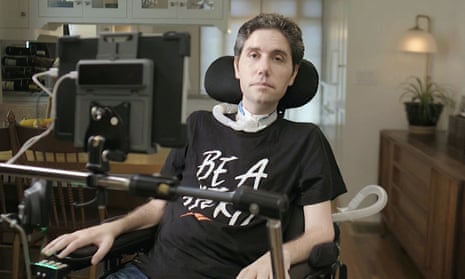The progressive activist Ady Barkan, who has amyotrophic lateral sclerosis (ALS, or motor neurone disease), said a top Republican in Congress owes “the entire disability community an apology” for spreading a digitally altered video of Barkan, who speaks through a computer, interviewing the Democratic presidential nominee, Joe Biden.
Steve Scalise, from Louisiana and the second-ranking Republican in the House of Representatives, tweeted a doctored video in which Biden appeared to tell Barkan he wanted to “defund” the police – a lie Donald Trump and his supporters have used in the presidential campaign.
In fact, Biden told Barkan he supports policing reform such as sending social services counselors on some calls, instead of police officers.
“And by the way, the idea, though,” Biden told Barkan, “that’s not the same as getting rid of or defunding all the police.”
The video tweeted by Scalise puts words into Barkan’s mouth, making him say, as he never did: “Do we agree that we can redirect some of the funding for police?”
Biden answers: “Yes, absolutely.”
“These are not my words,” Barkan tweeted at Scalise. “I have lost my ability to speak, but not my agency or my thoughts. You and your team have doctored my words for your own political gain. Please remove this video immediately. You owe the entire disability community an apology.”
Twitter flagged the video, alerting users it is a fake. Scalise deleted it from his Twitter timeline on Sunday night.
“While Joe Biden clearly said yes, twice, to the question of his support to redirect money away from police, we will honor the request of [Barkan] and remove the portion of his interview from our video,” the congressman tweeted.
Scalise’s office said it was fine to manipulate the video, which spokeswoman Lauren Fine told the Washington Post had been “condensed … to the essence of what he was asking, as is common practice for clips run on TV and social media, no matter the speaker”.
But splicing words into speech – not to speak of splicing computer-generated words into the digitized speech of a disabled person – is not “common practice” in any medium, on the part of any agent or outlet not seeking to deliberately mislead.
The few instances in which media organizations have broadcast video later revealed to be edited in a way that leaves out important context have caused outrage on both sides of the aisle.
Republicans led by Trump have been especially aggressive, branding the media “fake news” and the “enemy of the people” for accurately reporting information that does not reflect well on the administration.
In May, Trump called for the NBC host Chuck Todd to be fired after his show broadcast a truncated clip of the attorney general, William Barr, answering a question about the former national security adviser Michael Flynn. The clip left off the end of Barr’s answer. NBC apologized and issued a correction.
Barkan endorsed Biden at the Democratic convention, calling Trump an “existential threat” and demanding access to quality healthcare for all.
“We live in the richest country in history and yet we do not guarantee this most basic human right,” he said. “Everyone living in America should get the healthcare they need regardless of their employment status or ability to pay.”
